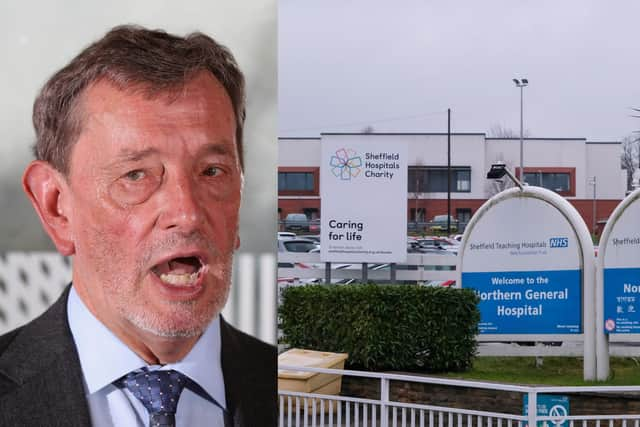David Blunkett says wife's long wait at Sheffield's Northern General Hospital lays bare NHS 'emergency'
He says their experience laid bare the ‘beleaguered’ state of the NHS and made it clear that urgent action is needed to rescue the health service. Writing in The Mail on Sunday, the former Home Secretary described how his wife Margaret had been suffering with a chest infection when, between Christmas and New Year, she developed dizziness and nausea, and their GP decided to call an ambulance.
Margaret was taken to the Northern General Hospital and Mr Blunkett said it was then ‘the state of our beleaguered health service really became apparent’. He added: “Margaret was stuck – along with half a dozen more ambulances waiting to discharge poorly passengers. It took four-and-a-half hours before she was admitted. To be clear, I have nothing but praise for the staff. Margaret, a recently retired GP, was in good hands at all times. But what happened to our family is replicated across the country.”
Advertisement
Hide AdAdvertisement
Hide AdMr Blunkett, who is now a member of the House of Lords, said people were ‘coming to accept’ long and often frightening delays before an ambulance arrives, while ‘traumatic’ waits outside hospitals were ‘now routine’. He claimed Labour had shown when it came to power in 1997 how the NHS could be reformed and similar action was now needed.


His plan to ‘resuscitate’ the NHS included investing in intermediary care for patients who were well enough to leave hospital but could not return straight home. He also suggested setting up ‘emergency units’ where ambulance crews could drop off patients before responding to other calls, and creating ‘field hospitals’ where Army medics could be deployed to address what he called a ‘genuine emergency’.
He also addressed the strikes by nurses and ambulance workers, saying that if you have a shortage of labour ‘you must make the job attractive by paying the wages necessary’.
“We must also listen to those working at the sharp end and take their ideas for reform on board. Only then can we break the inertia and ineptitude which is the hallmark of the present administration,” he added.
“Our family were lucky: I’m glad to say that Margaret is making a full recovery. Others have not been so fortunate. And unless we act right now, many more lives will be at risk.”
Hospitals in Sheffield have been ‘exceptionally busy’
Advertisement
Hide AdAdvertisement
Hide AdKirsten Major, chief executive of Sheffield Teaching Hospitals NHS Foundation Trust, said: “We are very sorry that Lord Blunkett’s wife Margaret and indeed other patients, have had to wait much longer than we would normally expect to be admitted recently.
“We have been exceptionally busy for the past few weeks and our staff have been working tirelessly across the whole of our services to manage the demand and provide the care required. We have opened additional beds, worked with the council to create additional social care capacity, and changed the way we receive emergency patients to try and enable ambulance crews to leave for other call outs.
“Senior colleagues have been working 24 hours a day with clinical teams throughout the holiday period to respond to the peaks in demand and wherever possible support those teams to deliver the care needed.”